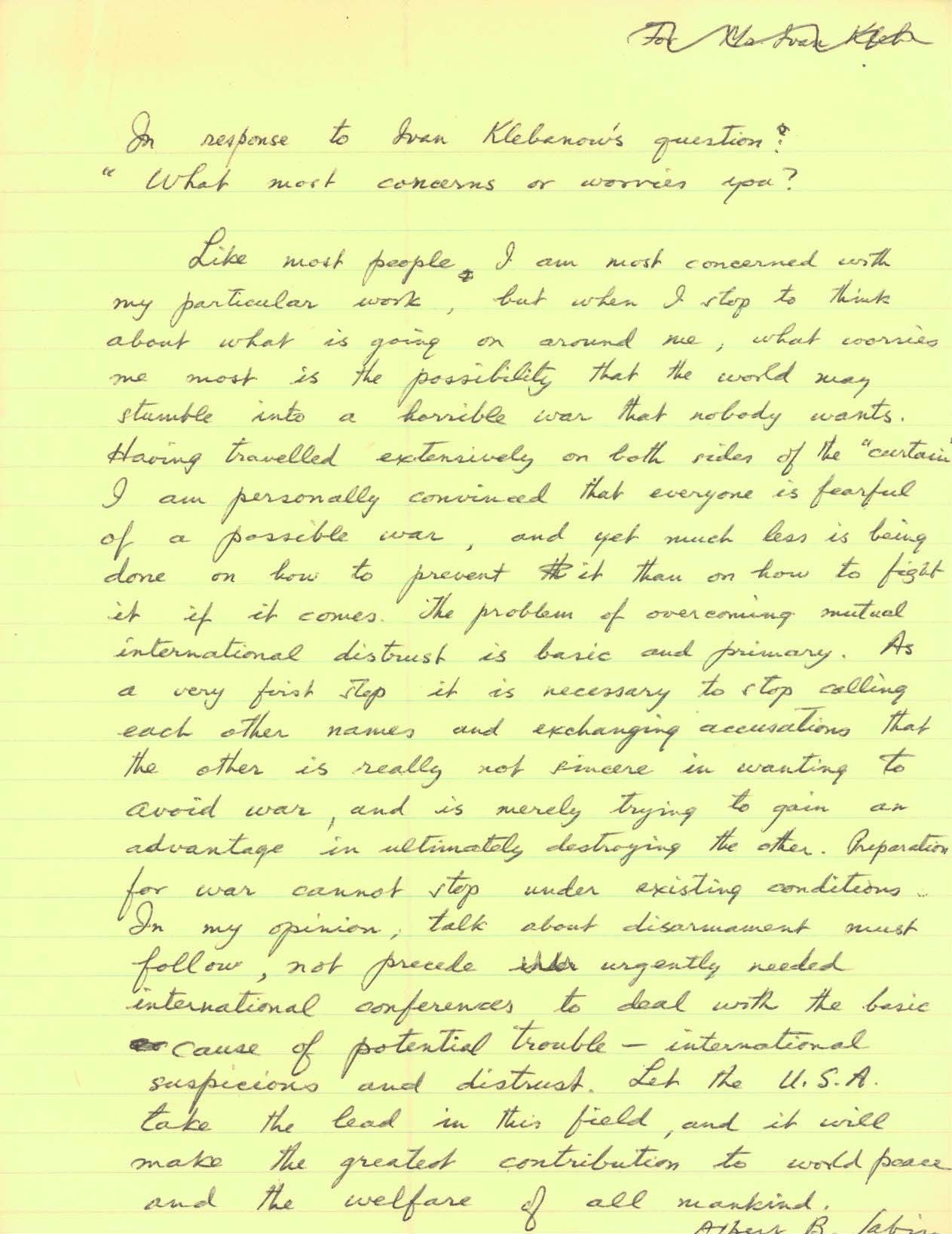[Sabin Archivist’s Note: This week features the first blog post from Richard Sookoor, the Sabin Project student assistant. Richard is pursuing his Bachelor of Science degree in neurobiology from the McMicken College of Arts and Sciences here at the University of Cincinnati. He will be blogging on different Sabin-related topics as we work on the project. Please give Richard a warm welcome to the blogging world by reading his posts! -SB]
A typical opinion when speaking of scientists is that they are mostly entrenched in their work, sometimes unmindful of the world around them. However, for many scientists, their view of the world influences their research and scientific endeavors. Dr. Sabin proves to be a good example. Having been deployed to numerous conflict areas by the US Army Medical Corps during World War II, Dr. Sabin was well aware of the impact and outcomes of great wars. His experiences in these areas led him to pursue research focusing on dengue fever [1], Japanese B encephalitis [2], and sandfly fever [3] even after the completion of his military duty.
Though despite his medical endeavors, Dr. Sabin took great notice of political and worldly issues. It wouldn’t be unwise to assume this shaped his opinions on war and international affairs for the rest of his life. In response to a question asked by Ivan Klebanow in 1960, Dr. Sabin speaks openly about “what most concerns or worries [him].” [4]
While he admits he is most concerned about his work, he professes that what worries him most is the outbreak of another great war. From 1950 to 1960, Dr. Sabin had traveled extensively throughout Europe and the USSR to speak at various conferences and events, as well as conduct minor research [5]. During this time, he witnessed the various threats issued by the USSR towards the United States and vice versa, as well as the ever expanding involvement of US military policy into foreign nations. For example, a week prior to Dr. Sabin’s response letter, the US had deployed 3,500 troops to Vietnam, further fueling the escalating crisis there and pushing the country towards the brink of war. With the Cold War looming, nationalism and anti-Soviet emotion were stronger than ever.
Dr. Sabin, in his rather candid response, explains the issues that helped escalate towards the oncoming conflict and suggests a general resolution. He even goes so far as to state that the US should be the first to renounce their threats and propose nuclear disarmament. Whether that was a common or popular sentiment at the time is debatable, but what is certain is that it was fairly uncommon for someone of such stature to openly show contempt for the (then) current state of affairs, much less suggest their country stand down in the face of nuclear annihilation. And while Dr. Sabin continued on with his research, the world around him would continue down the path to a war no one wanted.
It’s interesting that Dr. Sabin took the time to answer this question. The original letter is handwritten and (almost) personally addressed to Mr. Klebanow. Being as submerged in his research as he was at the time, when given the chance to speak his mind, Dr. Sabin displayed his sincerity as an advocate of world peace.
References:
[1] Archive of Dengue Fever Research by Albert B. Sabin, 1944-1955. Found in Military service, Sub-series Dengue.
[2] Archive of Japanese B Encephalitis Research by Albert B. Sabin, 1946-1970. Found in Military service, Sub-series Japanese B Encephalitis.
[3] Archive of Sandfly Fever Research by Albert B. Sabin, 1943-1959. Found in Military service, Sub-series Sandfly Fever.
[4] Letter from Albert B. Sabin to Ivan Klebanow, 18 March 1960. Found in Manuscripts, Box 28, Folder 14 – “What most concerns or worries you?” response to Ivan Klebanow, 1960
[5] Record of Travel by Albert B. Sabin, 1949-1992. Found in Professional and Personal Engagements, Sub-series Travel.
In 2010, the University of Cincinnati Libraries received a $314,258 grant from the National Endowment for the Humanities (NEH) to digitize the correspondence and photographs of Dr. Albert B. Sabin. This digitization project has been designated a NEH “We the People” project, an initiative to encourage and strengthen the teaching, study, and understanding of American history and culture through the support of projects that explore significant events and themes in our nation’s history and culture and that advance knowledge of the principles that define America. Any views, findings, conclusions, or recommendations expressed in this blog do not necessarily reflect those of the National Endowment for the Humanities.

